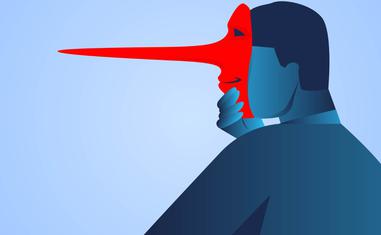The views expressed in our content reflect individual perspectives and do not represent the authoritative views of the Baha'i Faith.
I would like everyone to know that telling lies is really bad for you – bad for you spiritually, bad for you emotionally, bad for your relationships, and even bad for your own health.
Lies are toxic. They exert a similar influence on your inner spiritual self that disease-producing germs exert on your physical body. Being the recipient of a lie is equally toxic, as those of us who have experienced relationship betrayal painfully realize.
Now you might be saying “Everyone knows lies are bad, don’t talk to me as if I am stupid.”
RELATED: What Are the Core Baha’i Beliefs?
Well, I hear you, but lies run rampant – personal, professional, political, and certainly in the marketplace. If we all know lies are bad, why do they proliferate so widely? Why is lying being normalized and accepted, even institutionalized? For example, in politics a job called “spin doctor” exists, which according to the Cambridge dictionary is “someone whose job is to make ideas, events, etc. seem better than they really are.”
“Everyone does it,” seems to be a common refrain about lying, along with the notion that everyone tells at least one or two lies a day. But actually that isn’t true, and is based on old research that averaged all the respondents together and came up with the oft-repeated myth. New research on lying tells us that some people lie a great deal, while others – not at all. Averages can obscure the truth.
I’m wondering if our understanding of lying is similar to our knowledge of germs in the 1800’s. We know they exist, but we don’t realize how much damage they can do.
It’s hard to believe, especially after years of the COVID pandemic, that in the middle of the 19th century germs, originally discovered in the 1600’s, were ignored so completely that surgery was performed without sanitary concerns like washing hands and instruments and keeping the environment clean. The result? A disastrously high rate of infection after surgery. In fact, death from surgery was so widespread, there was a movement to outlaw it altogether. In the 1860’s Sir James Young Simpson, Surgeon and Professor of Medicine and Midwifery said, “A man laid on the operating table in one of our surgical hospitals is exposed to more chance of death than was the English soldier on the field of Waterloo.”
Then came the work of Joseph Lister, a surgeon who studied the work of Louis Pasteur and took seriously the idea that the subtle, invisible, and ubiquitous germ could be taking the lives of his patients. He devised ways to prevent the spread of infection in his surgery and the immediate drop in death rates eventually convinced his skeptical colleagues.
In the 1870 book Disease Germs; Their Supposed Nature: An Original Investigation With Critical Remarks, Lionel S. Beale explains some of the barriers to his colleagues understanding of germ theory. He said,
Of all the poisons which cause the death of man, the most subtle and most difficult to isolate and investigate are those which give rise to certain forms of disease which spread from person to person…
These poisons not only seriously derange the healthy functions, but having entered the body they multiply many million fold…The poison when it enters may be so infinitesimal in quantity, that it can neither be measured nor weighed…but having entered…it increases to such an extent that in many cases sufficient is produced in one subject to infect hundreds of person, the population of a town, or even a whole country.
Sounds to me like germs and lies have a lot in common. In terms of toxicity, Abdu’l-Baha, the son and successor of Baha’u’llah said:
Consider that the worst of all qualities and the most odious of all attributes, and the very foundation of all evil, is lying, and that no more evil or reprehensible quality can be imagined in all existence. It brings all human perfections to naught and gives rise to countless vices. There is no worse attribute than this, and it is the foundation of all wickedness.
Those are strong words. No ambiguity there. No spin. At the heart of lying is betrayal of interpersonal trust that is completely at odds with the Baha’i Faith’s core message that all humankind is one. Lying makes oneness impossible.
Sam Harris, author of Lying, explains that:
Lying is, almost by definition, a refusal to cooperate with others. It condenses lack of trust and trustworthiness into a single act. It is both a failure of understanding and an unwillingness to be understood. To lie is to recoil from relationship.
Evelin Sullivan in her book The Concise Book of Lying claims that all lying boils down to two motivations that exploit others for personal gain – either to hide the truth or to make someone believe a falsehood. Basically, people lie to get what they want, and they often feel justified in doing so when they feel they cannot get what they want any other way.
RELATED: How to Bring Truthfulness Back into Our Culture
Sullivan’s book traces the history, nature, effects and categories of lies beginning with the Bible and coursing deeply through literature, science, history, and politics. She points out the millions of hours spent by groups devising more and more complex ways to deceive (like hackers) while countervailing groups (like security analysts) spend millions of hours to prevent that same deception.
All this would be unnecessary if humanity heeded the message of Baha’u’llah, who said:
The purpose of the one true God in manifesting Himself is to summon all mankind to truthfulness and sincerity, to piety and trustworthiness, to resignation and submissiveness to the Will of God, to forbearance and kindliness, to uprightness and wisdom. His object is to array every man with the mantle of a saintly character, and to adorn him with the ornament of holy and goodly deeds.
…for truthfulness is the foundation of all the virtues of the human world, and without it prosperity and salvation are unattainable to any soul in all the worlds of God. Whensoever this holy attribute becometh securely established in one’s being, the acquisition of all heavenly virtues will be realized.
Lies wear many disguises from being “little and white” to being “for the other person’s good.” But according to Baha’u’llah’s revelation, it is “the truth, the whole truth and nothing but the truth,” as they say in the court room, that sets us free.
Abdu’l-Baha said that we are like the surgeons of his time who didn’t realize the perniciousness of germs. Regarding lies, he said that untruths are so bad for us, we should chose to have our throat cut rather than tell one:
The root cause of wrongdoing is ignorance, and we must therefore hold fast to the tools of perception and knowledge. Good character must be taught. Light must be spread afar, so that, in the school of humanity, all may acquire the heavenly characteristics of the spirit, and see for themselves beyond any doubt that there is no fiercer hell, no more fiery abyss, than to possess a character that is evil and unsound; no more darksome pit nor loathsome torment than to show forth qualities which deserve to be condemned.
The individual must be educated to such a high degree that he would rather have his throat cut than tell a lie, and would think it easier to be slashed with a sword or pierced with a spear than to utter calumny or be carried away by wrath.
The Baha’i writings repeatedly entreat us to observe the path of truth. Abdu’l-Baha wrote:
Let truthfulness and courtesy be your adorning. Suffer not yourselves to be deprived of the robe of forbearance and justice, that the sweet savors of holiness may be wafted from your hearts upon all created things. … Beware … lest ye walk in the ways of them whose words differ from their deeds. Strive that ye may be enabled to manifest to the peoples of the earth the signs of God, and to mirror forth His commandments. Let your acts be a guide unto all mankind, for the professions of most men, be they high or low, differ from their conduct. It is through your deeds that ye can distinguish yourselves from others. Through them the brightness of your light can be shed upon the whole earth.
When you tell the truth, your light shines brightest.

















Comments
Sign in or create an account
Continue with Facebookor